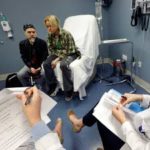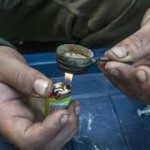Hi again. I know I haven’t been posting much lately, but it’s time to get back on that horse. One thing I did in the interim was write a chapter for a volume on addiction. Which led to a strange conundrum…and some soul searching.
But before getting to that, I’ll tell you what inspired me to keep blogging for now. First, I opened Google Analytics and found that I’m still getting 200 hits per day…even after weeks with no new posts. People remain interested in our alternative and progressive approach to addiction. Wonderful! Second: I met Sandy P at my father’s memorial in California last week. And she told me she not only still exists but she follows my blog. Amazing. Sandy was my brother’s girlfriend, and Abbie, her next-door neighbour, was mine, when we were in our late teens. (When I was first getting into drugs, Abbie was my salvation. Until I took off for Asia: no Abbie, lots of drugs.) Thanks, Sandy, for a sweet hit of nostalgia.
 Now about that chapter. I’ve had papers rejected by publications lots of times. It’s part of the rat race of being an academic, a researcher, submitting your best work to journals, waiting for the letter from the editor, finally getting that heart-stopping email and reading it and Oh Shit! They’re rejecting it?! Without even a “revise and resubmit!” Damn ignorant asshole editors. Too good for your shitty journal anyway… Then the anger and disappointment start to evaporate and you start thinking about what journal to send it to next. That’s the life of an academic. And that’s one reason I was glad to be done with it, and why, about eight months ago, I swore to myself I was done with academic writing.
Now about that chapter. I’ve had papers rejected by publications lots of times. It’s part of the rat race of being an academic, a researcher, submitting your best work to journals, waiting for the letter from the editor, finally getting that heart-stopping email and reading it and Oh Shit! They’re rejecting it?! Without even a “revise and resubmit!” Damn ignorant asshole editors. Too good for your shitty journal anyway… Then the anger and disappointment start to evaporate and you start thinking about what journal to send it to next. That’s the life of an academic. And that’s one reason I was glad to be done with it, and why, about eight months ago, I swore to myself I was done with academic writing.
But I caved. A colleague in Toronto, an addiction doctor, urged me to write a chapter for a book for addiction doctors, to spell out my learning model of addiction, and how it reconceptualizes the data on brain change in addiction, for the benefit of…well, addiction doctors. Because, even though they’re doctors, they don’t necessarily buy the disease model of addiction. At least they don’t necessarily buy all of it, or maybe they’re uncomfortable with it, or maybe, just maybe, the field is changing. (This particular doctor specializes in ACT for his patients.)
 So I wrote the chapter. Took pieces from other work, revised them, wrote some new stuff, trying to make it accessible for all those doctors out there, because they don’t really understand human development very well and they sure don’t understand psychology very well. So, why not give them the benefit of my stratospheric perspective. (LOL) I spent a couple of weeks working pretty hard, sent it in, and soon heard back from the editor. Thank you for submitting your chapter for publication in “A prescriber’s guide to methadone and buprenorphine for opioid use disorder…” Which is when I said to myself, those ignorant editors! They got the wrong book. Or the wrong title. Or something. I can’t write a chapter that urges ditching the medical model for a damn prescriber’s guide!
So I wrote the chapter. Took pieces from other work, revised them, wrote some new stuff, trying to make it accessible for all those doctors out there, because they don’t really understand human development very well and they sure don’t understand psychology very well. So, why not give them the benefit of my stratospheric perspective. (LOL) I spent a couple of weeks working pretty hard, sent it in, and soon heard back from the editor. Thank you for submitting your chapter for publication in “A prescriber’s guide to methadone and buprenorphine for opioid use disorder…” Which is when I said to myself, those ignorant editors! They got the wrong book. Or the wrong title. Or something. I can’t write a chapter that urges ditching the medical model for a damn prescriber’s guide!
As mentioned, I’ve had my work rejected by numerous publications. But this was the first time I rejected the publication. Even after I’d done all the work. Even when they said Yes, we want it! I wrote back and said, I’m sorry but I can’t contribute a chapter to a prescriber’s guide, or to anything called a prescriber’s guide. Because if the whole point of the book is to get a better handle on prescribing methadone and buprenorphine, then GO AHEAD AND CALL IT A DISEASE! Why not?
My colleague hadn’t told me that this “book for addiction doctors” would be entitled a prescriber’s guide to anything. Maybe he didn’t know. He emailed  me after I withdrew my submission and said: Addiction doctors prescribe opioid substitutes to 95% of their opioid-addicted patients. Like: duh…didn’t I know that? Yes, I knew that, more or less. And I knew that
me after I withdrew my submission and said: Addiction doctors prescribe opioid substitutes to 95% of their opioid-addicted patients. Like: duh…didn’t I know that? Yes, I knew that, more or less. And I knew that  opioid addicts are often in desperate need of opioid substitution therapy (OST). It helps them get off the street and sometimes stay off, it relieves the overwhelming anxiety of withdrawal, and it saves lives. As Maia Szalavitz often reports, it’s the only evidence-based treatment that saves lives. And of course that’s because heroin, especially when it’s laced with or replaced by fentanyl or its analogues, can be deadly.
opioid addicts are often in desperate need of opioid substitution therapy (OST). It helps them get off the street and sometimes stay off, it relieves the overwhelming anxiety of withdrawal, and it saves lives. As Maia Szalavitz often reports, it’s the only evidence-based treatment that saves lives. And of course that’s because heroin, especially when it’s laced with or replaced by fentanyl or its analogues, can be deadly.
So why would I avoid being featured in such a book? Maybe I should have just swallowed my whatever and revised the chapter. All those words distinguishing physiological dependency from addiction (which I maintain is a psychological process)…they would have to go. And so would that pep talk about listening to the person, not the diagnosis, and using your counselling skills, your human skills, to reach beyond just prescribing. I’d have to shelve  all that. I fully advocate the use of methadone and Suboxone. I agree with other progressive addiction specialists (e.g., Mark Willenbring) that they should be easily available wherever they’re needed, free of cost, free of line-ups, free of stigma. But I’ve got nothing to contribute to that argument. Right?
all that. I fully advocate the use of methadone and Suboxone. I agree with other progressive addiction specialists (e.g., Mark Willenbring) that they should be easily available wherever they’re needed, free of cost, free of line-ups, free of stigma. But I’ve got nothing to contribute to that argument. Right?
Can we social-development-oriented “addiction specialists” refute the disease model and still advocate OST?
 I told myself I’m trying go avoid an awkward irony: that there’s maybe one good reason to call addiction a disease. In the US and Canada it’s the only way to get addicts their medicine, their heroin substitutes. I’ve thought about this
I told myself I’m trying go avoid an awkward irony: that there’s maybe one good reason to call addiction a disease. In the US and Canada it’s the only way to get addicts their medicine, their heroin substitutes. I’ve thought about this  lots. But I remain concerned and confused. Maybe “medicalization” is the best we can do for people who are in a real jam, on the street or close to it, hunting for heroin day by day. Yet it maintains, in fact it strengthens, the premise that these people are sick, and it sidelines all the familial, social, economic, and cultural forces that pushed them into that lifestyle in the first place.
lots. But I remain concerned and confused. Maybe “medicalization” is the best we can do for people who are in a real jam, on the street or close to it, hunting for heroin day by day. Yet it maintains, in fact it strengthens, the premise that these people are sick, and it sidelines all the familial, social, economic, and cultural forces that pushed them into that lifestyle in the first place.
Somehow these two perspectives on opioid addiction have got to come together. At least in the present social climate. But I’m at a loss as to how to help that happen.
Or maybe it’s simple. Maybe we just need one or two catchphrases to merge these two approaches: phrases like “harm reduction,” or maybe “working with the individual where they’re at.” In my next post, I’ll tell you about a treatment program in New York City where that kind of conceptualization governs everything they do. I gave a talk there two weeks ago, met some fabulous people, and learned how the field is changing. Stay tuned.

Leave a Reply to *D Cancel reply